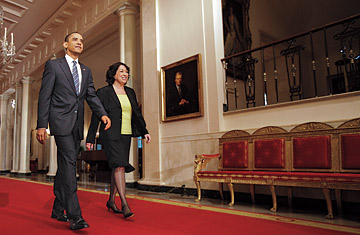
The President with Sotomayor, the first Hispanic female to be nominated to the U.S. Supreme Court.
(5 of 6)
Leading the charge will be Jeff Sessions of Alabama, who became the top Republican on the Senate Judiciary Committee when Arlen Specter switched parties last month. Sessions himself was once a Reagan nominee to the federal bench who was rejected by this same committee--at the time controlled by Republicans--after he called the American Civil Liberties Union and the National Association for the Advancement of Colored People "un-American," reportedly telling a colleague that they "forced civil rights down the throats of people." He now runs the risk of becoming the story if he says anything that could be interpreted as indelicate. So after Sotomayor's nomination was announced, Sessions responded with a statement as blandly worded as a high school civics paper: "The Senate Judiciary Committee's role is to act on behalf of the American people to carefully scrutinize Ms. Sotomayor's qualifications, experience and record."
Meanwhile, Republicans are pushing to slow down the process, to give themselves maximum time to find that incendiary something in her rulings and public statements. Senate Majority Leader Harry Reid has said he'd like to see Sotomayor confirmed before the Senate leaves town on Aug. 7 for its summer recess.
Texas Senator John Cornyn, a Republican on the Judiciary Committee, says Obama has agreed to a "John Roberts timetable"--there were 74 days from the day the Chief Justice was nominated to his swearing-in. For Sotomayor, the equivalent date would be Aug. 6, but Kevin McLaughlin, a spokesman for Cornyn's office, now says that date might not give Republicans enough time. "Given the length and breadth of her record, we're not sure it's possible to meet that deadline," he says.
Conservatives who want to go after Sotomayor may find more ammunition in her public statements outside the court than in her rulings. During a panel discussion at Duke University four years ago, Sotomayor said the federal court of appeals is where "policy is made," the kind of statement that can get you tagged an "activist" judge who tries to make law instead of interpret it. Sotomayor appeared to know that was the danger in the words she had let slip, because she quickly added, "And I know that this is on tape, and I should never say that. Because we don't 'make law' ... I'm not promoting it, and I'm not advocating it."
In a 2001 speech at the University of California, Berkeley, Sotomayor aired the view that judges' gender and ethnic backgrounds inevitably affect their decision-making and probably should. She said then, "Justice O'Connor has often been cited as saying that a wise old man and wise old woman will reach the same conclusion in deciding cases. I am also not so sure that I agree with the statement ... I would hope that a wise Latina woman with the richness of her experience would more often than not reach a better conclusion than a white male who hasn't lived that life."
